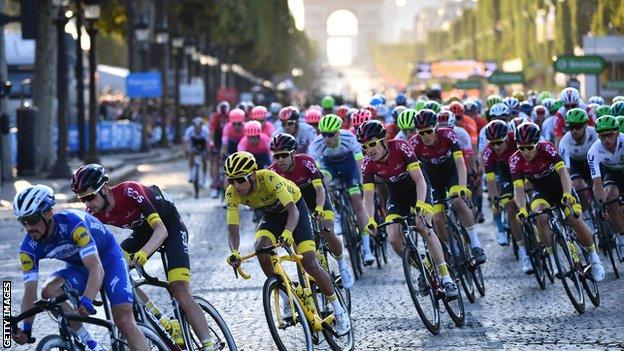Tour de France to start in August as Giro & Vuelta overlap
- Published

This year's Tour is scheduled to start in Nice and finish in Paris
The Tour de France will start on 29 August, with the Giro d'Italia and Vuelta a Espana overlapping during October, the UCI has announced.
Cycling's three Grand Tour races are part of a packed schedule across just over three months from 1 August.
The Tour de France - pushed back from June - had been cast into doubt when the French government said it was "not sure" the country would be ready.
France last week extended a ban on mass gatherings until September.
That was because of the coronavirus pandemic, and French sports minister Roxana Maracineanu cast questions over the Tour de France's viability for 2020 when she said on Tuesday: "We do not know what the epidemic will be like after lockdown."
The Tour had been scheduled to run from 27 June to 19 July originally; that start date was pushed back last week by the UCI, world cycling's governing body.
It will stick with that adjusted schedule, starting on 29 August and ending on 20 September.
La Course by le Tour de France, the women's race, was initially scheduled to take place over one day on 19 July on the Champs Elysees in Paris. It will now take place on the opening day of the men's Tour.
The Giro d'Italia will run from 3-25 October, and the Vuelta from 20 October to 8 November, seeing two of the biggest races of the season run concurrently.
The cycling calendar has been affected significantly by the pandemic.
The men's season is set to begin with the Strade Bianche one-day classic in Italy on 1 August and end on 8 November with the Vuelta, which has been reduced by three days.
Other major races include the 'monument' classics Milan-San Remo on 8 August, Liege-Bastogne-Liege on 4 October, Tour of Flanders on 18 October, Paris-Roubaix on 25 October and Il Lombardia on 31 October.
The Road World Championships, which will be held in Switzerland, remain in their 20-27 September slot.
The women's calendar runs from 1 August with the Strade Bianche, and ends with the two-day Madrid Challenge by La Vuelta on 8 November.
The eight-day Giro d'Italia Internazionale Femminile is set for 11-19 September. And the first women's Paris-Roubaix will take place in October.
"Paris-Roubaix is an iconic race, one of the races that attracts most fans in cycling and if we can attract those same fans to women's cycling, I think it's a really positive thing," said Britain's Lizzie Deignan, who won the world title in 2015.
Many large-scale sporting events scheduled to take place this summer have either been called off, such as Wimbledon, or pushed back by a year, such as football's European Championship and the summer Olympics.
UCI president David Lappartient said: "We have drawn up a solid, attractive and varied new calendar that is as realistic and coherent as possible.
"The recommencement of our activities will remain dependent on the evolution of the world health situation," he added.
Analysis
Matt Warwick, BBC Sport
The UCI is nothing if not determined. It has outlined almost a season's worth of racing in just 12 weeks, set to take place across some of the countries worst affected by the coronavirus, in a sport which cannot be self-contained in sanitised, empty stadia.
As if the frantic schedule is not enough, it will have to constantly analyse any given territory's lockdown rules and wait for them to be relaxed enough to allow a peloton through.
All the races which are usually scheduled as perfect preparation events for the three-week Grand Tours are now a quick-fire mish-mash which will surely bring about some unexpected winners and losers. The iconic Stelvio pass in the Italian Dolomites is surely going to be getting seriously chilly in late October. And at the same time cycling's toughest race of all, the foreboding Paris-Roubaix, could be the mother of all mud-baths on the freezing cobblestones of northern France.